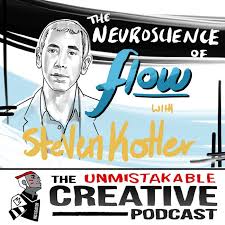People frequently ask me what I’ve learned from the 100’s of people that I’ve interviewed. In attempting to summarize what they’ve taught me I’ve written a book, another book, and 100’s of articles. They’ve changed my habits, helped me rewrite my story, and accomplish things that at one time seemed impossible. These are some of the most valuable lessons I’ve learned over the last decade of interviewing more than 700 insanely interesting people.
PSYCHOLOGY AND MINDSET
1. Everybody is Faking It
We live in a world that encourages to craft an image that is polished, perfected and run through our Instagram filter of choice. There’s no facebook photo album for a person’s inner turmoil, and the darkest of our thoughts are deemed inappropriate for public consumption. Because our view of a person’s world is one dimensional, we fill in the gaps and construct false images of who they are. At first, this realization is disturbing. But once we’ve come to terms with it, we’re liberated to make choices that serve us.
2. Ego is the enemy of everything you hope to achieve, will achieve and have achieved.
When you have experienced any success, it’s tempting to believe that you are entitled to whatever comes your way. Ego often derails the promising careers of many people. As a result, rising stars usually spend the rest of their careers lingering in obscurity.
3. We don’t have to conquer fear. We have to change our relationship with it.
Fear serves a very practical purpose. It helps us to survive. But so often we try to suppress our fear, and in doing so, we suppress ourselves. When we stop resisting uncomfortable emotions, they start to lose their power over us.
4. Secrets Are the Currency of Intimacy
There is not a single of one us who doesn’t have a secret that we wouldn’t want anybody to know about. All of us have skeletons in closets, dark and twisted thoughts, and guilty pleasures. But when we can find just one person to share a secret with, even if it’s anonymous, we live more freely.
5. Creativity can build a bridge between people.
When Jonathan Kislev was growing up in Israel, he was terrified of Arab’s. When a teacher offered him the opportunity to go and paint with Arab kids for a weekend, he said: “no way I don’t want to die.” But that weekend forever changed the heart of a 12-year-old boy. The simple act of painting a mural together built a bridge between a group of people in a region torn apart by conflict for decades, and a young boy who loved to paint, after serving in the Israeli Military became a peace activist.
6. We can choose wonder over worry
I’ve spent my whole life worrying about the future. When I was in high school, I worried about college. In college, I worried about getting a job. After finishing school, I worried about getting married. And none of my worries led to anything useful. But wonder and curiosity ignited my creativity, and lead to almost everything I’m doing today
7. Your temporary circumstances are not your permanent identity.
When something terrible happens to us, the sting of it feels permanent. If we’re not careful, a circumstance will become our identity. And when a temporary circumstance becomes your permanent identity, you limit what’s possible in your life
8. One of our great misperceptions is that we can fill an internal void with an external accomplishment.
Whether it’s getting accepted to an Ivy League School, making the New York Times Best Seller list or selling your startup, the “high” from this experience will be temporary. We fail to account for what Sasha Heinz described to me as hedonic adaptation. Our standards and our reference groups change.
When I got my book deal in 2015, I was thrilled. Up until that point, my reference group was people who didn’t have a book deal. Shortly after, my reference group changed. It was other published authors. Many of them had sold thousands of books and hit bestseller lists. That became my new standard for success, and the “high” wore off.
Imagine that you sell your startup for 50 million dollars. You’d probably walk around with a shit eating grin on your face for a few weeks. Maybe you’d buy yourself a few toys, pay off some debt, etc. Eventually, the “high” would wear off. David Hansson echoes this sentiment in his article The Day I became a millionaire. Because of hedonic adaptation, being rich is your new normal. And whatever void you thought it would fill, would be replaced by a new one.
9. Becoming the best version of yourself is possible, but it sometimes requires making a major change in your life.
You might have to move from where you live, break up with the person you’re dating, or leave a job you hate to become the best version of yourself. None of these things are easy or comfortable. In fact, they’ll probably suck in the short term. But it’s better to make short-term sacrifices for long-term gains rather than the other way around.
10. Great ideas emerge from imagination and possibility, not being realistic.
Most of what we take for granted today would have seemed unfathomable as little as a decade ago.
- Building a website in hours instead of weeks was unrealistic.
- It was unrealistic that we could push a button and car would show up.
If people had limited to their thinking to what was realistic and possible, the amount of innovation we’ve experienced in this last 10 years wouldn’t have occurred. Imagination is a pathway to infinite possibility and groundbreaking innovation.
11. Never make one thing the sole source of meaning in your life, whether that’s a job, relationship or creative endeavor
When you diversify the sources of meaning in your life, you increase the odds of fulfillment and decrease the odds of madness, disappointment and despair.
12. You can’t create your immortal beautiful work by comparing your insides to other people’s outsides
It’s easy to forget that our view into the lives of the people we envy is one dimensional. We compare and construct false narratives about what their lives must be like based on the books they write, the content they create, status updates and Instagram feeds.
13. Living a good life requires us to fill three buckets: contribution, connection and vitality.
If your contribution bucket is overflowing because you’re building an empire, putting in 100 hour work weeks, and attempting to change the world, eventually an empty vitality bucket will catch up with you. When all three buckets are full we live a good life. When one is overflowing and another is empty life gets out of balance.
14. There’s a point in every life journey when we reach a crossroads, a moment when we are forced to choose between what we should do and what we must do.
And “to step into that place of must, that place where you can totally fail is so scary… but on the other side of it are the greatest miracles of your life” says Elle Luna.
15. Questions are at the heart of virtually every innovation, insight and creative breakthrough.
The questions we ask can determine the results we produce. By asking a more beautiful question we increase the likelihood of more beautiful results.
16. The area outside your comfort zone is your magic zone.
That’s where remarkable achievements occur. It’s in the unknown that, the impossible often becomes possible. So give yourself a bit of time outside your comfort zone, and you might find yourself in a new one.
17. There’s great creative potential in the things that make you angry.
Throughout history, people have channeled their anger into activism that ignited social change, and into creative expression that resulted in innovation. In our anger, we can bitch and complain about the status quo or we can take anger and channel into redefining the status quo.
18. At the heart of most of our suffering is the belief that something has to change for us to be ok
As long as the cultural narrative of deficiency dictates our behavior, we’ll always feel as if we’re not enough. Lasting fulfillment begins when our narrative changes from deficiency to sufficiency.
19. The fallacy of composition causes us to believe that we have to optimize the individual for the group to thrive
This causes us to believe that the team with the best players is most likely to win, when in reality, it’s the team that plays well together that’s most likely to win.
20. Media is incredibly powerful in shaping our perceptions of the incarcerated.
While, the frightening scenes on TV shows like Lockup are real, there’s an entirely different side that we don’t see. I was lucky enough to visit San Quentin a few years ago. I shook hands with murderers, surprised by own misperceptions of what they were like. They were all part of a tech incubator started by a venture capitalist in an attempt to reduce recidivism.
21. If you give unconditionally, you’ll grow exponentially.
You could be successful or you could be significant. Success might get your picture on the cover of magazines. Significance could get you in the hearts and minds of people who your work has touched. Success might lead to a bigger bank account. Significance could lead to a bigger heart. These two things aren’t mutually exclusive. If you look at people like AJ Leon and Phillip Mcerknan, I’d say their significance outweighs their success. And the truth is we’re all better off for it. We all grow exponentially because they give unconditionally. But we’re taught to chase success instead of significance, metrics instead of what matter and prestige instead of purpose. It’s easy to forget about the infinite value of things that can’t be measured.
22. Success won’t heal your emotional wounds.
History is littered with the careers of celebrities and famous artists who overdosed on drugs and committed suicide. These are people who seemingly had everything going for them. And yet, fame, fortune, and millions of fans didn’t make up for the darkness that ultimately led to their death. Tucker’s books have sold millions of copies, but what surprised me most about our conversation was not his success, but his pain.
23. Finding happiness in our everyday moments is possible.
When we reserve our happiness solely for wedding days, babies being born, promotions, and our most significant accomplishments, we do ourselves a great disservice. Only a fraction of our life is deemed worthy of our happiness
24. There’s no mythical date in the future when the conditions will be perfect.
We all harbor the illusion that there will be a moment in our lives, when the debts are paid, our ducks in a row, and we’ll have the courage and conviction to pursue our wild-eyed dreams.
25. Disruption to your life can be a systemized and deliberate choice.
I’ve always admired Colin Wright’s extreme lifestyle experiments like letting his blog readers determine where he should move to next, living without a smartphone, and owning only 50 possessions.
While we don’t have to make such extreme decisions, we can change the defaults of our lives and make deliberate choices.
26. We’re all broadcasters
We’re sending a signal to the world in the words we use, the messages we share, and the way we treat people. And we can broadcast happiness or misery. What we broadcast has a measurable impact on every area of our lives.
27. Figure out the essence of your goals
Why do you want something? What do you think it will give you? One of Yanik’s clients had the goal to become a billionaire. After asking him how he would use the billion dollars, it turned out he didn’t need to become a billionaire. When you’re not clear on the essence of your goals, it’s easy to chase illusions that don’t give you any long-term satisfaction.
28. If you want to experience exponential personal and professional gain, you have to reprogram your mind.
We’re programmed with behaviors and beliefs from the time we’re born. But if we don’t make a conscious effort to rewrite the operating system, we’ll always be scratching our heads about the dissatisfying results in our lives.
29. Emotional resilience gets built by the choices we make in our moments of tragedy and adversity
It’s up to us to decide if something is going to make us or break us. We may not able to change an event or circumstance. But we can choose how we respond. It’s up to us whether we’re informed or defined by adversity.
30. Everyone has a life story that is open for invention
That’s story is fluid, dynamic and changing constantly. By changing his story, Joe Loya outgrew his prison cell. I’ve jokingly said that he probably read more books in solitary confinement than I did at Berkeley.
31. This is not your practice life
Out of fear and doubt, we treat life as a dress rehearsal. Practicality drives us instead of purpose, success instead of significance. But a life of intention and meaning is deliberate. It’s not dictated by the opinions of people who will never live with the consequences of your choices, even if those people are loved ones and family members.
.
32. People will live up to the identity you assign to them.
Nadia Lopez is a principal in one of the toughest school districts in the country. Most of her students come from incredibly low-income families. But the thing that struck me most in her book and my conversation with her was that she refers to all of her student as scholars. As a result, she’s played an instrumental role in many of them going to college.
33. Media creates masks. It shapes our perceptions of people
Until I met Glenn Beck in 2013, I had no idea who he was. But it was clear from what I had read that people, many of who were in my own audience, didn’t think very highly of him. And the first websites I visited didn’t have anything flattering to say about him. At that moment, I decided to stop doing any research. I didn’t want my perceptions of him to be colored based on what I read. Given that he loved my book, I knew we had to agree on something. I’ve had other incredibly liberal friends who have met Glenn and were pleasantly surprised. George Lange told me that while he was in the hospital, Glenn Beck was one of the only people who called him every day. As a former member of his staff put it, he’s the most misunderstood man in the world.
34. It’s possible to be more with less.
Low prices, 2-day delivery, and the ability to buy more than we could ever possibly use in a lifetime have fueled a culture of conspicuous and even wasteful consumption. But how much of what we have do we actually need? The less stuff we have, the more we can make space for what actually matters.
35. Don’t be afraid to be a kid sitting at the grown-ups table
As we get older, we write off our creative impulses as pointless pursuits. With enough seemingly harmless criticism and judgment our creative self-expression gets stifled and eventually silenced. Let your creative voice speak and you might to be surprised and delighted by what it has to say
36. There are conversations we are afraid to have.
They might make us uncomfortable, and we assume that the window through which we experience a person’s life is an accurate reflection of reality. But that doesn’t mean we should avoid difficult conversations. The price of our avoidance is often something far too high, the loss of human life.
37. While some conversations are challenging, others are courageous
Sometimes our courageous conversations will require us to speak up and even hurt another person in the process. As painful as a break up might be for the person on the receiving end, it is a courageous conversation. Staying in a relationship you don’t want to be in does no good for either person involved.
38. Navigating a creative life means navigating uncertainty
It’s a life in which nothing is guaranteed; everything is an unknown and anything is possible. It’s not for everybody. But for some people, they can’t imagine any other way to live. The work chooses them as much as they choose it.
39. Nobody ever gets to the end of their life and says “I did way too much stuff”
We expand through a diversity of experience. Experiences are the colors that enable us to paint the masterpiece of our lives.
40. Most of our barriers are imagined limitations so powerful they dictate our reality
They become the lens through which we not only see the world, but make decisions about what we can and can’t do.
41. If you argue for your limitations, you get to keep them.
All of us have limitations. It might be a limitation of resources or it might be a limitation of time. But we can argue for those limitations or we can attempt to change them. The first keeps us stuck where we are. The second opens us up to the possibility of growth.
42. Throughout all of our lives, there’s a golden thread that weaves our story together.
Every event, moment, and creative impulse is a stitch. And with each stitch, we gain clarity and a sense of purpose about what we’re here to do.
43. Until you’re willing to take 100% of ownership for the results in your life, the success rate of your personal development efforts will be limited.
It’s great to read books, attend seminars, and work with coaches. But if you don’t take action on what you’re learning and responsibility for your results, you’ll get stuck in a vicious cycle of dependency on spiritual teachers.
44. Even in the direst of circumstances, something as tragic as a life sentence in prison, it’s possible to find redemption.
Most of us can’t imagine something as tragic as serving as a life sentence. But if there’s one thing that we can learn from people have been incarcerated and come out of the other side, it’s that redemption is possible in any circumstance.
45. Music is a universal language that dissolves the barriers of race, religion, and politics
It’s a deep connection to our humanity that gives all of us the potential for peak aliveness.
46. Sometimes we use noble reasons as excuses not to pursue our dreams.
There’s a great scene in the movie The Rookie, which is about a high school science teacher who pursues his dream of becoming a major league baseball player. The main character calls his wife while he’s pitching in the minors and tells her he thinks it might be time to come home. She tells him to stay and pitch for one more week. But the most important thing she says is “what kind of message are we giving to our son if you give up.” What struck me most about my conversation with Jia Jiang is that the birth of his son became the catalyst to pursue his dream, rather than an excuse not to. He told me that he never wanted to be telling his son “you’re the reason I gave up.”
RELATIONSHIPS
47. Realizing the people we love will be gone someday puts a much higher value on the time we spend with them.
A few years ago I spoke with Frank Ostaseski from the Zen Hospice project. I asked him about one of my greatest fears that one or both of my parents wouldn’t be around to see me fall in love, get married, and have kids. It’s hard not to think about when you’re 40, and these things haven’t happened. But rather than tell me how to deal with the fear, he said I should spend time with my aging parents now, not only after some significant milestone had occurred.
It’s not like we’re the Brady Bunch. My sister moved far away for medical school and was gone for the better part of the last decade. After years of living at home, I’m sure my parents were as tired of me as I was of them. Sometimes I”m messy which drives my mom crazy. And other times I make decisions that don’t make any sense to my dad. Despite our differences, the doors always open and food is always on the table. So after my 40th birthday, I decided to start going home for dinner every Sunday.
48. Everybody is wounded and doing the best they can with what they have.
Bob Goff is like the uncle we all wish we had. There’s a childlike sense of wonder to the man that he hasn’t lost with age. He teaches a class at the Pepperdine Law School. Since he’s required to hold office hours, he holds them at Tom Sawyer Island on Disneyland. My first conversation with him was about love. And I was still healing from a break-up. He told me about the first time his heart was broken. Then he told me the story of how he met his wife, by putting PB&J sandwiches on her windshield every day. Now that I’ve had some distance from the pain that people caused me, I see that everybody is wounded and doing the best they can with what they have.
49. Forgiveness will set you free.
If there’s anyone who has a reason to have hate in his heart, it’s Scott Stabile. His parents were murdered when he was a teenager. But eventually, he forgave the man who did it. When we carry hate in our hearts, we allow our lives to become defined by the people who hurt us. But when we forgive them, we create an opening for greater levels of meanings, significance, and purpose.
50.If you a low opinion of yourself you’ll attract people who agree with that low opinion.
For the longest time, I thought I’d feel better about myself when I finally fell in love. When fuck yes or no became the default filter through which I made decisions about my dating life, I started to have a much higher opinion of myself.
51. Long-term self-worth is the foundation of meaningful connection with another person
When I hired Nick Notas as a dating coach, I was beyond frustrated. Despite having many great first and second dates, they rarely lead to third dates. Over the course of our work together, I realized how desperately I’d wanted the validation and approval of women for my whole life.
Any interaction driven entirely by the need for approval and validation from another person is not only incongruent, but it’s also inauthentic. Even if you get what you want, the foundation of your connection is a house of cards.
52. There are four noble truths of love. And they fly in the face of conventional wisdom and pop culture narratives
1. Relationships are uncomfortable
2. Thinking that Relationships are supposed to be comfortable is what makes them uncomfortable
3. Meeting discomfort together is love
4. There is a path of liberation to liberation from suffering
PRODUCTIVITY
53. A notebook is a platform for your imagination.
This is why I say you should always carry one. A notebook is a paradox of constraints. The limitation of nothing but pen and paper allows for the imagination of unlimited possibilities.
54. The value of downtime is underrated.
When we daydream, disconnect and sleep, the default mode network in the brain is activated. This is usually when some of our most critical creative breakthroughs occur. If you can’t solve a problem, sleep on it.
55. People are 500% more Productive in a State of Flow
Flow not only amplifies virtually every aspect of performance. It’s immensely measurable. It can make hours feel like minutes, and days feel like hours. In a state of flow, your creative output goes through the roof. The most extraordinary accomplishments of human beings from building billion dollar companies to surfing hundred foot waves are all the result of flow
56. Your brain is a terrible place to store information.
That’s why you should build a second one. We consume more information in a given day than we used to in a month. But consumption becomes valuable only when it sparks insight. If your brain is using all of its capacity to store information, you reduce the amount of bandwidth for processing and analyzing that information
57. Peak performance doesn’t happen by optimizing one area of your life.
If you sacrifice rest for work, the work will suffer. If you sacrifice your health for your habits, you won’t be able to maintain those habits long term.
58. Study after study shows we’re terrible at multitasking.
And yet we persist in trying to work with our phones in plain sight, and our inboxes open. If you’re serious about building an insanely productive life, stop multitasking.
59. If the environment around you is designed for better choices, it’s easier to make better choices.
If you want to avoid distractions, use a too like Rescuetime to block them. If you’re going to eat healthier food, don’t stock your fridge with junk food. By designing your environment for better choices, you build the identity of the person you want to become.
60. Interference of any kind derails our attention and degrade performance.
It doesn’t matter whether that interference comes from objectives in your environment or digital distractions. The result is subpar performance. As I recently said, attention is the currency of achievement, and we should spend it wisely.
61. Routines and habits are powerful.
But they can also result in a somewhat myopic view of the world that cuts off the possibility of adventure.
62.If you can own your day, it becomes much easier to own your life.
The little things we do repeatedly have consequences and can lead to big changes. This applies to everything from your diet to your reading habits. Instead of trying to create the greatest year or of your life, start by creating the greatest day of your life.
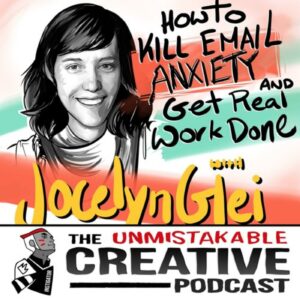
Listen
63.Variable rewards are what make many of our digital distractions highly addictive.
Whether it’s email, Facebook, Twitter or Instagram, the fact that you never know what you’re going to get keeps you coming back for more. The smartest behavioral scientists in the world of have designed this products to get you completely hooked.
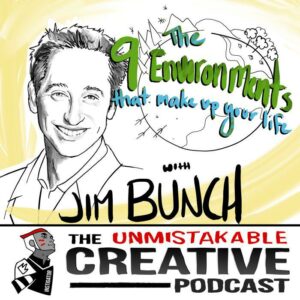
Listen
64. One of the fastest ways to change your life is to upgrade one of the 9 environments that make up your life.
For example if you start stock your fridge with nothing but healthy food and start eating well, you’ll feel better. Because you have more energy you’ll start exercising. As a result you’ll look better, and your self image will improve.
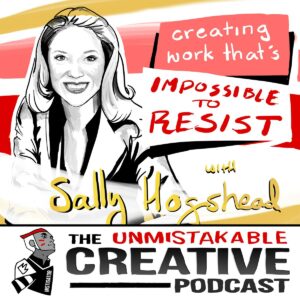
Listen
65. We don’t have to learn to be interesting. We have to unlearn boring. – Sally Hogshead
When we’re young, our self-expression is uninhabited. We tell stories that make no sense. We dance, draw, sing, laugh and play. This lesson was reinforced for me when I had a conversation with my friend’s 5-year-old daughter about her views on the education system.
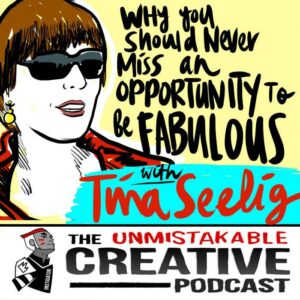
Listen
66. Passion Follows Engagement
The idea of passion makes for great commencement speeches, platitudes, and self-help cliches. But talk to most people who supposedly found their passion, and what you’ll see is they chose to focus on what they found engaging, which eventually lead to mastery of their craft.
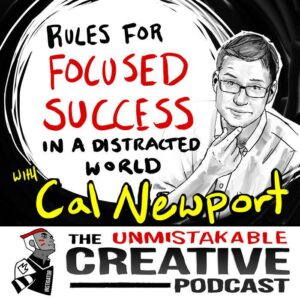
Listen
67. Deep work leads to a thriving and fulfilling career.
As sources of distraction keep infiltrating our lives, the ability to do deep work is becoming more rare, and more valuable. As a result, the people who master the skill have a significant competitive advantage over those who don’t.
It takes deep work to build a company like Facebook. But it doesn’t take deep work to use their product.
It takes deep work to write an article for a site like medium, but it doesn’t take deep work to scroll through an article rapidly.
Whether it’s writing a book, building a company or learning to play an instrument, deep work is where the magic happens.
68. If you want to change the world, you have to see reality as malleable.
Of all the things that Justine Musk said to me about Elon, this is the one thing that stood out the most:
He has a way of taking the world that’s in his head and imposing it on the world around him until it looks like the world in his head.
But this ability doesn’t come without a cost. As a society, we glorify the accomplishments of billionaires and successful entrepreneurs. We put their pictures on the covers of magazines and write books about them. We idealize their lives even though the view we get is one dimensional. What Justine defined as extreme success requires “a need and drive that is so compelling defines your life.”
69. This is the first time in history where it’s risky to do what’s considered safe.
There was a time when a job at a big company guaranteed as safety and security for life. When I graduated from business school in April 2009, there was all this talk about the economy improving. But what was overlooked was that fact that the economy had undergone a fundamental change. Technology has reduced dependency on human labor and given us the ability to create at scale in a way that we never could before. When I graduated from UC-Berkeley in December 2000, it took thousands of dollars and hundreds of hours to build a simple web site. Today can it can be done in a matter of hours. We are on the verge of an inflection point in which the gap between creativity and technology will cease to exist, and we will have the capacity to go from idea to execution at a speed that is unparalleled in the history of humanity.
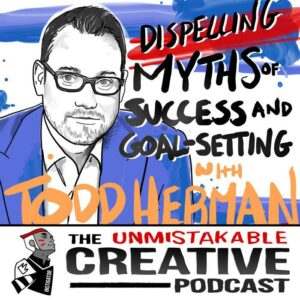
Listen
70. Performance matters more than potential.
Potential has a beautiful ring to it. It makes for great Instagram memes and platitudes. But nobody is judged on their potential. They are judged on their performance.
It’s a harsh lesson. Most of the clients who work with Todd Herman are not interested in improving their potential. They have that in droves. They come to him because they want to improve their performance.
The year Tom Brady was drafted to the NFL he a 6th round draft pick. All of the quarterbacks who were picked before him appeared to have much more potential. They had been stars in college. Tee Maguire led his team to the NCAA championship. Carmazi was an incredible athlete in college. But when they got to the NFL, their performance didn’t match their potential. Carmazi played one game for the 49ers.
Tom Brady, despite being a sixth-round draft pick, walked up the New England Patriots owner Bob Kraft on his first day of practice and said: “Mr. Kraft my name is Tom Brady.” And Kraft said “I know who you are. Brady said, “I’m going to be the best decision you ever made.”
His performance outweighed his perceived potential, and he did become the best decision Bob Kraft ever made.
71. Deliberate Practice is Essential to Becoming an Expert in your Field.
“Repetition is the mother of skill” is a frequently repeated phrase. It causes people to treat Malcolm Gladwell’s 10,000-hour rule as gospel.
But mindless repetition is not deliberate practice.
Considering my habit of writing 1000 words a day. If all I did was go through the motions, I wouldn’t improve as a writer. So I read the books of authors work I admired. I worked with a writing coach. I also pushed my self to write more than a 1000 words day because deliberate practice requires you to challenge yourself. There’s a diminishing return on progress when you stay within your comfort zone.
Deliberate practice is not a “productivity-hack.” It requires you to step past your comfort zone, improve your performance outside that zone, and return tomorrow until the boundaries of your comfort zone are redefined.
72. Attention for your work is not a birthright. It has to be earned.
Maybe you’re envious of the people who have built massive audiences for their creative work, companies with thousands of customers. But these accomplishments are earned by showing up every day for years on end.

Listen
73. When a sense of purpose drives, you-you’ll be happier and more successful.
When a sense of purpose drives you, you’ll inevitably work harder because you believe so much in your mission. Purpose fuels grit, and grit fuels accomplishment. It’s a virtuous cycle that leads to some of the greatest work fo your life.
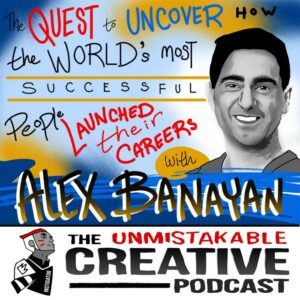
Listen
74. Extraordinary accomplishments are rarely the result of a linear path.
When I spoke with Alex Banayan about his new book, he told me about two paths that we could take.
The first path is linear: go to school, get a job, pay your dues, climb the ladder, etc. The second path is exponential. You skip steps. You ignore convention and conformity. You defy the status quo.
If you plotted the both of these life paths on a graph, the linear path would initially appear to a better choice. It would appear safer, secure and more lucrative. The exponential path would initially seem risky and unprofitable. But if you look at both paths on the graph five or ten years in the future, the exponential path will shoot up, while the linear path eventually hits a plateau. Choosing the second path isn’t easy. It requires you to ignore your social programming and temporarily deal with doubt and disappointment from many of the people in your life.
75.If you want to build a billion dollar company, solve a problem that helps a billion people.
When you attempt to solve a problem that will help a billion people, you’ll attract the kinds of people who can help you make it happen because the mission matters so much. This is what Peter Diamandis calls a massively transformative purpose.
76. The first boss you choose will be more important than the job itself.
It’s tempting to choose the biggest paycheck, the most prestigious company, or impressive sounding job title. But if you do that at the expense of having a good boss, you’ll limit your potential for growth.
77. Talent is overrated.
The myth of natural talent lets us off the hook. It gives us an excuse not to develop the skills that could turn us into masters of our craft. Having a natural talent, you don’t practice, nurture and develop is almost as bad as not having that talent at all.
78. Real Artist don’t starve.
The myth of the starving artist has infiltrated our consciousness for decades. Parents discourage their kids from careers in the arts out of fear that their lives will be a struggle. We’re encouraged to be practical instead of purposeful. We’re told that our art is an enjoyable hobby, but not something that we should try to turn into a career. And no doubt there are some hard truths that come with building a creative career. But buying into the narrative that starving and suffering must coexist with a career in the arts is not only unhealthy. It’s wildly inaccurate.
79. Developing an unmistakable style for your work comes from decades of practice.
My friend Mars Dorian has been drawing for 3 hours a day, ever since he spotted a stack of comic books next to the ice cream
80. You are always getting paid, and you’re getting paid in the currency you’re asking for.
If you’re asking for FB likes, that’s what you’ll get paid in. If you’re asking for money that’s the currency, you’ll get paid in. One of the biggest challenges I’ve seen aspiring creatives struggle with is asking to be paid for their work. It’s something I’ve struggled with myself. But eventually, I realize that getting paid for creative work allows you to make more of it, to keep giving your gift to the people who appreciate it. It allows you to keep playing the infinite game of creativity.
81. Throughout your life seeds get planted for who will eventually become.
They get planted with the experiences you have, the work you do, and the people you collide with. If you look carefully at what you’ll uncover is a throughline, a theme, an arch, and narrative, that contains in the ingredients to help you get from good work to great work
81. Your body of work has greater long-term value than your resume.
At this point in my life, my resume is useless. The real inventory of a meaningful, full color, full contact life is a body of work. Don’t pad your resume. Build a body of work instead.
82. Constraints combined with limited resources breed creative solutions.
An abundance of resources often blinds us to possibilities. A scarcity of them allows seeing what we wouldn’t otherwise. This is why startups often outmaneuver large companies. They have no choice but to be resourceful. Their survival depends on it.
83. Others influence every artist in their field.
It’s not a coincidence that my books are a blend of social and behavioral science combined with personal development. Most of the books I read fall into this category. Steal like an artist, get ingredients, and create your own recipes.
84. All artists have to contend with critics math.
1000 Fans + 1 Critic = 1 critic. Seinfeld creator Larry David attended a baseball game, at which he received a standing ovation. On his way out of the parking lot, somebody drove by and said: “Larry, you suck.” He spent the rest of the night talking to a reporter about the critic.
85. Ownership is essential to building wealth.
It doesn’t matter what you own whether it’s intellectual property (i.e., books, creative work, etc.), equity in a company, or real estate. Let’s say that you have a job. While you’re at the job, you build a body of work outside of your day job (books, podcast, etc.). When you leave that job, you can take your body of work with you because you own it.
86. Everybody has a story worth telling.
Just because they don’t write books, appear on TV, or get interviewed in podcasts, it doesn’t mean that people’s stories don’t matter. Remember that your story, just like everyone else’s is a work in progress.
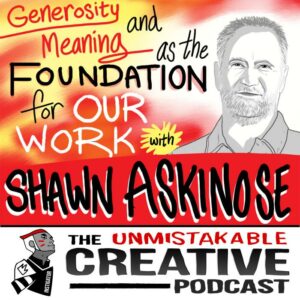
Listen
87. Just because something is scalable, that doesn’t mean you should scale it.
In many ways, scalability is our litmus test for whether something is worth it or not. Scalability makes investors salivate, and our eyes bulge with the possibility of fame and fortune.
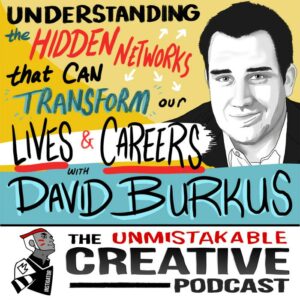
Listen
88. All of us belong to hidden networks that have the potential to transform our lives and our careers.
And they are rarely going to found at networking events where you get drunk and exchange business cards. More often than not, they’re a friend of a friend.
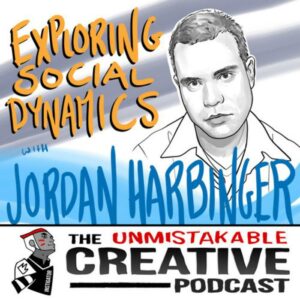
Listen
89. One of our biggest perceptions is that influencers are defined only by their status.
But within virtually any environment, you’ll find people who may not have status, but have influence. Don’t underestimate the impact that being kind to somebody’ assistant will have on you
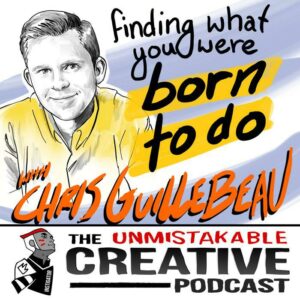
Listen
90. When it comes to our professional lives, there’s work we’re able to do, and work we are born to do.
But we often settle for what we’re able to do because it’s comfortable, it works, or it pays well. Figuring out what you’re born to do might cause people to question your sanity. It might require you to endure rejection and failure. But in the end, if you get to do what you were born to do, the juice is worth the squeeze.
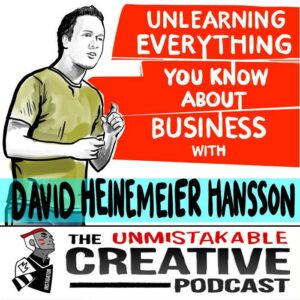
Listen
91. There are multiple definitions of success.
But if you love your life believing that there is only one definition of success, you’re inherently limited by that definition. If you succeed according to someone else’s definition of success, you’ve still failed because you’ve lived up to expectations other than your own. Having your own definition of success is essential to your happiness.
92.If you want to connect with your zone of genius, spend time each day, asking the following questions Insert genius question.,
But if you love your life believing that there is only one definition of success, you’re inherently limited by that definition. If you succeed according to someone else’s definition of success, you’ve still failed because you’ve lived up to expectations other than your own. Having your own definition of success is essential to your happiness.
93. The last safe investment and the one with the highest ROI is the one you make in yourself.
In the last 20 years, we’ve seen two recessions. First, we had the dot-com meltdown in 2000, followed by the financial crisis of 2008. Some people invested their money in retirement plans for decades, only to be left with nothing.
94. Building great teams requires managers to challenge the people that work for them and give them opportunities to grow.
When people don’t have the opportunity for growth, they stagnate, and what results in subpar performance of the group as a whole.
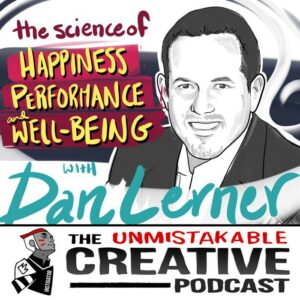
Listen
95. Don’t expect to change the world in a really short amount of time.
If you do your setting yourself up for maybe success on stage, but failure off. If you want to pursue a life that’s interesting, that’s purposeful, that’s fulfilling, know that it might take a while longer. And those things that you’re interested in will come together in due course. Just don’t set your bar so high that it’s unreachable.
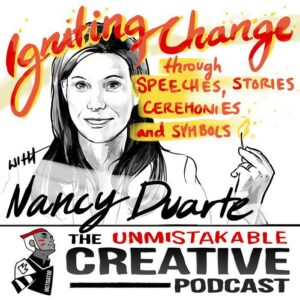
Listen
96. Creating a movement doesn’t happen with one speech, one blog post, or one podcast.
It’s the result of a multi-year commitment to your cause. It’s the cumulative effect of every action you take over the course of a lifelong journey.
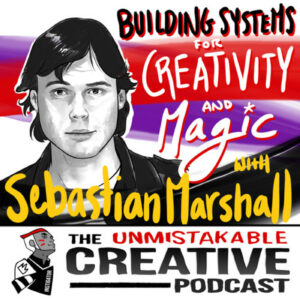
Listen
97. Everybody who spends 4 hours a day working on whatever is most important to them is successful.
The important thing here is not the amount of time, but the willingness to prioritize whatever it is that’s most important to you. If you want to be a writer, make the time to write every day. If you’re going to learn to code, spend time programming every day.
98.
Your cumulative creative output matters more than any individual piece of work. Nobody builds an artistic legacy by becoming a one-hit wonder. Look at any iconic creator and what you’ll discover is a substantial body of work.
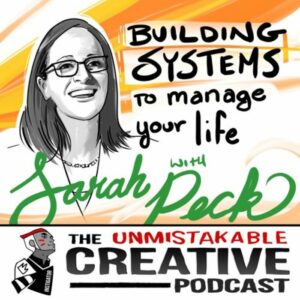
Listen
99. Building Systems Helps You Manage your Life
By building systems for your work and your life allows you to automate decisions, be more efficient and spend more time working in your zone of genius. systems, every day starts to feel like chaos. You waste your cognitive bandwidth and your time.
100. If you don’t appreciate what you have now, you’ll never appreciate what you get later.
With everybody’s achievements on 24-hour display, it’s natural to get addicted to the success and achievement. But, what’s the point if you’re stuck on a perpetual treadmill of dissatisfaction.
Over the last ten years, the guests on Unmistakable Creative have given me an education that kicked the crap out of the one I got in school. What I’ve shared above is a small fraction of what they’ve taught me. If you’re interested in learning more, I’d recommend listening to a full interview. Just be warned it’s a rabbit hole that runs deep that will likely change your perception of what’s possible and the way you see the world.






















































